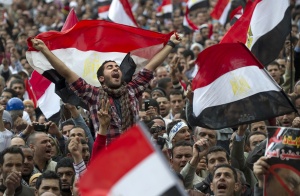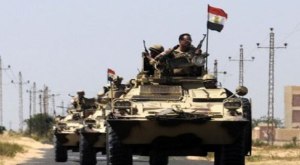Today, President Mohammed Morsi of Egypt has been declared to no longer be in office by General Abdul Fattah el-Sisi. Decreeing that Morsi had “failed to meet the demands of the Egyptian people”, and not meeting a deadline made by the army, the constitution has been suspended and an interim government has been announced. Adly Mansour, the chief justice of the Supreme Constitutional Court since 1 July, has been given the reins of power until new elections, expected in a few weeks.
As the reader may know, this is a highly divisive and current issue, and there are many sides to the same story. The Muslim Brotherhood have been accused of governing with a strong bias towards their Islamist power base, and failing to rectify the poor economy that has seen chronic fuel shortages and rising food prices. The Muslim Brotherhood had also clashed with the Supreme Constitutional Court as they sought to force through constitutional change, and conciliation with opposition parties has been low through the first – and only – year of Morsi’s tenure. This post is not arguing that the President Morsi, or the Muslim Brotherhood, is the best party for Egypt, or that their actions have been credible. However, this post does argue for due democratic process, and this is something that Egypt, and the world, is not witnessing.
Perhaps the recent, and independent, intervention by the army should be highlighted. In a western society, it may be taken for granted that the armed forces are depoliticised and can take no action regarding the political process. Except in a national emergency, which is to be confirmed by a democratically elected government, the army should not even be deployed in regards to law and order. Keeping the peace and protecting the welfare of civilians is the responsibility of the police – who are civilians themselves. Soldiers are not civilians and there is certainly is no need for General Abdul Fattah el-Sisi to consider himself a kingmaker, under the pretence of serving the people. To repeat: the army has no role in the democratic process.
Consider that stations such as Al Hafez, Al Nas & Misr 25 have stopped broadcasting after el-Sisi’s address to the nation. There are wide condemnations when communications are restricted by a government when protests rise: is this intervention by the army any different? The Guardian reports that six journalists have been detained by police and are being transported to an unknown location. The military has also warned that the armed forces and police would deal “decisively” with any violence following the address. Armoured personnel carriers and tanks are being deployed, as well as armed soldiers, in key locations. These are ominous messages that may not herald a dark future for Egypt, but these messages do reveal a democratic process in Egypt which is incredibly vulnerable to military intervention and pressure.
The people should decide who is elected to govern their country. They did – Morsi won approximately 52% of the vote. Just over a year into his tenure, he has been ousted by a military coup (and it is a coup – do not think otherwise) for not heeding the calls of the Egyptian people. Most governments decry demonstrations when their tenure has been less than a four/five year term – Morsi got one year. Even Morsi held that peaceful demonstrations were lawful, though he also thought that he knew best. What the world witnessed tonight was a government which was toppled by the army. The army suspended the constitution and enacted its own temporary law after a coup. An interim government has been declared and put in place by the army. Where a democratic process should have demonstrations, petitions, protests, and parliamentary procedure, Egypt witnessed violence and a coup. While we hope that Egypt will see a brighter future, a stronger economy, and a more united people, these things can – and should – be brought about by elected politicians, and the people who those politicians represent.
Tonight, this post does not celebrate the downfall of a divisive president. Tonight, this post mourns a military coup in Egypt which promises no end to violence, crackdowns to dissent, and possibly even worse.
—
Current Sources:
http://www.guardian.co.uk/world/middle-east-live/2013/jul/03/egypt-countdown-army-deadline-live
http://www.bbc.co.uk/news/world-middle-east-23173794
http://news.sky.com/story/1111276/egypt-military-coup-ousts-president-morsi
http://edition.cnn.com/2013/07/03/world/meast/egypt-protests/index.html
http://www.guardian.co.uk/world/2013/jul/02/egypt-morsi-military-tahrir-square
http://www.bbc.co.uk/news/world-middle-east-23154233
Coup D’Etat In Egypt: Military Removes President Morsi And Suspends The Constitution
http://www.theatlantic.com/infocus/2011/02/egypt-a-new-turning-point-for-the-revolution/100007/

